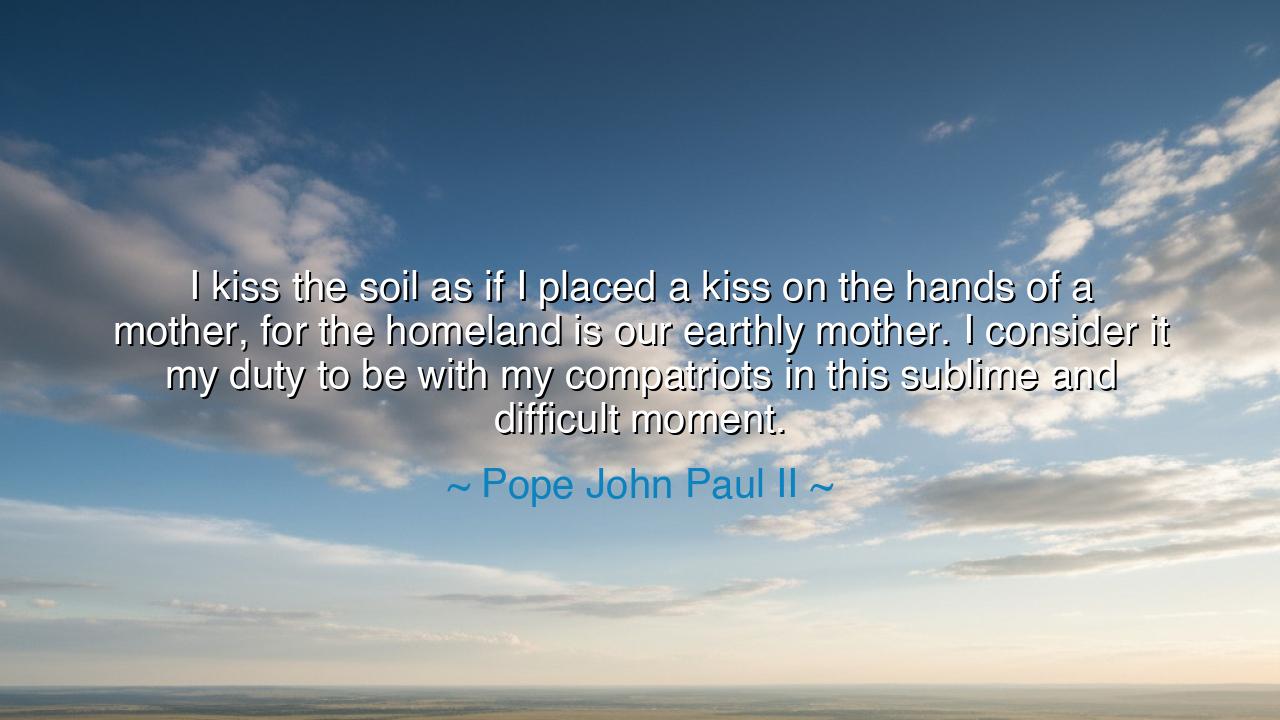
I kiss the soil as if I placed a kiss on the hands of a mother
I kiss the soil as if I placed a kiss on the hands of a mother, for the homeland is our earthly mother. I consider it my duty to be with my compatriots in this sublime and difficult moment.






“I kiss the soil as if I placed a kiss on the hands of a mother, for the homeland is our earthly mother. I consider it my duty to be with my compatriots in this sublime and difficult moment.” Thus spoke Pope John Paul II, the pilgrim of faith, the shepherd of nations, and the son of Poland whose soul was carved from the stone and spirit of his homeland. In this utterance lies both tenderness and might — the love of a son for his mother and the courage of a man who stands beside his people in their suffering. It is a statement not merely of patriotism, but of sacred devotion — to one’s homeland, to one’s people, and to the divine dignity that unites them.
When John Paul II first knelt and kissed the soil of Poland upon his return in 1979, it was not a gesture of custom but of reverence. His nation had long been bruised by tyranny — divided by foreign powers, ravaged by war, and shackled under the grip of communism. Yet its spirit endured. That simple act — bending low to kiss the earth — was a silent declaration to the world: This land is sacred because its people are sacred. In that kiss, he honored the homeland as a living mother, one who nourishes her children with memory, language, and hope, even when stripped of freedom. To love one’s land, he taught, is to honor the place where God has planted the seed of one’s soul.
“For the homeland is our earthly mother,” he said, and in those words he revealed the spiritual depth of patriotism. True love of country is not born from conquest or pride, but from gratitude — the same gratitude one feels for a mother’s care. The homeland gives us roots, identity, and the sense of belonging that anchors the heart. To betray it is to betray oneself. Yet this love must not harden into hatred or division; it must be a love that uplifts all, that defends truth, and that serves peace. As the ancients taught, the soil is not ours to own — we are its stewards, bound by duty to protect it and to honor the generations that came before.
Consider the story of Poland itself, the land of John Paul II’s birth. For over a century, it vanished from maps, its name erased by empires. Yet the Polish spirit did not die. Its poets wrote in secret; its priests prayed in hidden chapels; its mothers whispered the old songs to their children at night. The homeland lived not in borders but in hearts. When John Paul II returned, he rekindled that hidden flame, reminding his people that no oppressor can possess a soul that remembers where it came from. His kiss upon the soil was not just an act of love — it was an act of resurrection. Through it, he gave his people courage to rise.
In calling it his duty to be with his compatriots, the Pope showed that love of homeland is not sentiment alone but sacrifice. When one’s nation suffers, to stand apart is to abandon one’s mother in her hour of need. He could have remained in safety, a distant observer of Poland’s pain, but he chose to return, to share in the struggle of his people. In this, he mirrored the ancient heroes — Moses returning to his enslaved people, or Aeneas carrying his father from the burning city — men who knew that true leadership begins not with command, but with compassion. To love one’s homeland is to serve it with courage, even when that service brings danger.
And yet, this teaching extends beyond any single nation. The homeland, as John Paul II understood, is not only a plot of earth; it is every place that shapes us, every community that shelters our beginnings. Each of us, no matter where we were born, must cherish the soil that nurtured us, honor the people who gave us life, and carry within us the responsibility to make our home a place of justice and peace. When we forget our roots, we drift; when we remember them, we stand firm, even in the fiercest winds.
Lesson: Love your homeland as you would love your mother. Protect it, honor it, and when it falters, help it rise. But let your patriotism be gentle, not cruel — rooted in compassion, not pride. Kiss the soil not as a symbol of power, but as a promise of service. Be with your people not only in times of joy, but in their moments of trial. For as Pope John Paul II showed, the homeland is more than land — it is the soul of a people, the first echo of heaven heard upon the earth.
So live as children of that sacred soil. Wherever fate carries you, let gratitude for your beginnings guide your heart. And when you walk upon your homeland again, tread softly — for you walk upon the ground that has cradled your ancestors and will one day cradle you. To honor it is to honor the divine mystery that gave you life — the eternal bond between earth, soul, and heaven.






AAdministratorAdministrator
Welcome, honored guests. Please leave a comment, we will respond soon